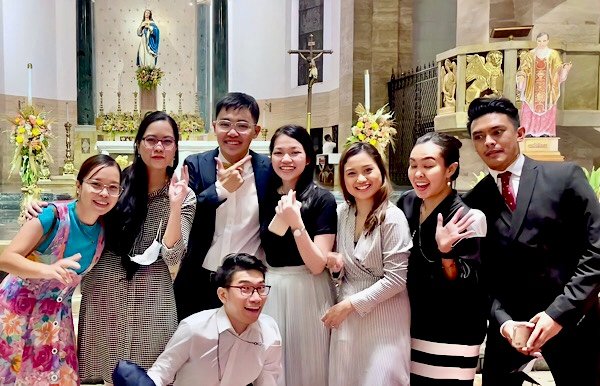Growing up, I learned from my family the importance of living a good life by practicing the teachings entrusted by Our Lord to his Church. This is why I was happy to discover Saint Josemaría Escrivá, known as the “saint of the ordinary.” He has guided people across the globe in their efforts to imbue with Gospel values the most ordinary human endeavors.
For him, “when a Christian carries out with love the most insignificant everyday action, that action overflows with the transcendence of God. That is why I have told you repeatedly, and hammered away once and again on the idea that the Christian vocation consists of making heroic verse out of the prose of each day. Heaven and earth seem to merge, my sons and daughters, on the horizon. But where they really meet is in your hearts, when you sanctify your everyday lives.”
Through the years I continued nurturing my devotion to St. Josemaria and to pass it on to friends and family, peers… and at times to random strangers whom I encounter during my day.
It all began in 2016, in my final year at PAREF Northfield School in Quezon City. On June 26 of that year, I decided to attend one of the many Masses organized for the feast of Saint Josemaria - the one at the Manila Cathedral. Since then, I would attend yearly a Mass in June organized in honor of St. Josemaria, to thank the saint — whom I call “Father” — for helping me to discover this way that gives full meaning to life: to serve God and souls in the ordinary things of each day.
COVID-19 struck in early 2020, which interrupted public gatherings and many other activities. It prevented me and many others from attending regular Mass. I missed the June 26 Masses.
Amid the disruption, it was laudable to see the Church’s agile efforts to bring Our Lord’s teachings to the faithful through cyberspace. Masses were streamed online, including some St Josemaria Masses. I was grateful for these, but it became clear to me that these were a far cry from the on-site participation in the Eucharist with its incalculable benefits, as Pope Francis wrote in his recent Apostolic Letter “Desiderio Desideravi.”
Hence, when the government finally relaxed public health restrictions in 2022, I was more than eager to help out in the preparations for the different on-site masses for the feast of the Founder of Opus Dei.

I helped organize a Mass in our local parish and volunteered as cantor for some portions of the liturgy. Our choir’s poor voices were accompanied by beautiful music from the Mecosono chamber orchestra, whose members have personal devotion to St. Josemaria. After the Mass, I was happy to hear the priest remark that our celebration sounded like a Mass at the Vatican.
In other locations throughout the country, I learned that people organized programs and novenas, as well as social outreach projects to celebrate this feast. That made me realize that the idea of holiness lived in the world is loved by so many, regardless of age, gender, social status or any other personal circumstance.
The Solemn Mass at the Manila Cathedral last June 27 whipped up so much anticipation in me. I was one of the young men assigned to assist the bishops and priests at the altar, so I had to arrive earlier to practice, with the rest, the motions of the liturgy.
As we were rehearsing at the altar area, the choir was practicing at the loft. The liturgical songs were a mix of English, Filipino, and Latin hymns rendered by an all-female choir 50-strong, accompanied by a violin and the pipe organ. Their sound filled the cathedral and left me in awe. I was close to tears.

It was more moving to experience later how the music produced by the choir, the movements of the servers at the altar, and the devotion of the people attending Mass, all harmoniously complimented and enriched the Eucharistic celebration.
Presiding the ceremony was the Apostolic Nuncio to the Philippines, Archbishop Charles John Brown. Four bishops and some 30 priests concelebrated with him. Manila Archbishop Jose Cardinal Advincula was also in attendance.
Archbishop Brown’s homily was most inspiring (Read full text here). It bared his love for Opus Dei and its message that God has always used the “work of human hands” to perform some of His greatest miracles.

“We come with hearts filled with gratitude and joy this evening to celebrate the memory and the teaching of this great saint who has shown us a way of sanctification in the modern world,” the Nuncio said.
A notable feature that made that night special was the sense of family that was palpable in the Cathedral. I saw how everyone was so happy meeting friends and relatives whom they had not seen in person for two years, following the pandemic restrictions. Even the staff at the Cathedral were happy to have the Opus Dei “family” back.
I was happy to meet various friends and acquaintances there. I thanked God for the indescribable experience.
In 2021, I made new friends online through a regular podcast I organized for the year of Saint Joseph. A few of us, following the suggested formula by Father Donald Calloway, completed our Consecration to Saint Joseph in October 2021. We fondly call ourselves the “ConJoe”.
We dreamt of meeting each other all together in person someday, given that a few hailed from Cebu. Everything fell into place when one of them convinced the two others to fly from Cebu to Manila. This allowed all of us to attend that memorable Mass at the Manila Cathedral last June 27, as a “family.”

